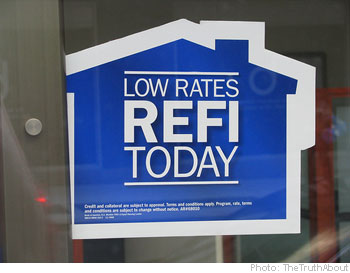 The New York Times reports that many people who would like to refinance their mortgages into lower interest rate 30 year fixed rate mortgages are unable to do so.
The New York Times reports that many people who would like to refinance their mortgages into lower interest rate 30 year fixed rate mortgages are unable to do so.
Of course, were households able to refinance their mortgages, their probability of default would fall, because the present value of their mortgage balance would fall (effectively lowering the loan-to-value ratio) and payment-to-income ratios would also fall. At the same time, because the cost of capital for lenders is low, financial institutions would find the refinanced loans profitable.
But when a lender holds an underwater loan, it wants to earn as much profit as possible, and so hasn’t sufficient incentive to lower the interest rate. The judgment of these lenders is that the profit gained by continuing to charge a high interest rate is greater than the potential losses from the increased probability of default. At the same time, other lenders do not want to take out a loan that is underwater. Hence, people are stuck.
This is surely socially less than optimal–keeping foreclosures as low as possible is in everyone’s best interest at the moment. So here is a policy proposition–if a borrower has always been current on repaying their mortgage, they get to refinance at the current low rate of interest. Financial institutions are being subsidized with unnaturally low interest rates. Borrowers should get their share of those subsidies.
Disclaimer: This page contains affiliate links. If you choose to make a purchase after clicking a link, we may receive a commission at no additional cost to you. Thank you for your support!



Leave a Reply